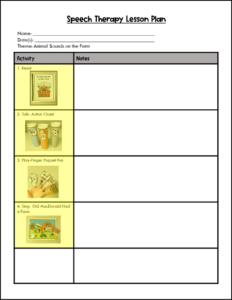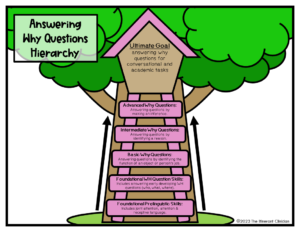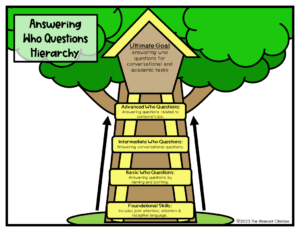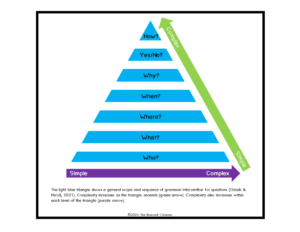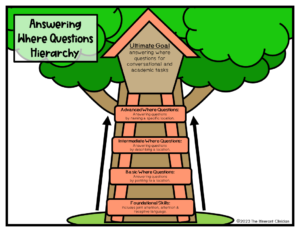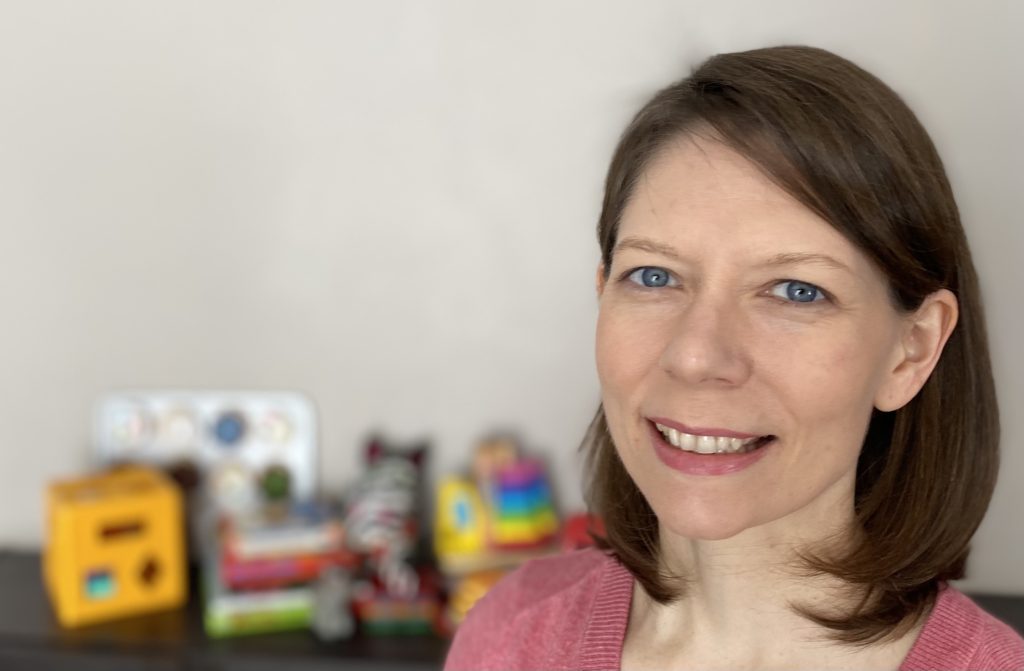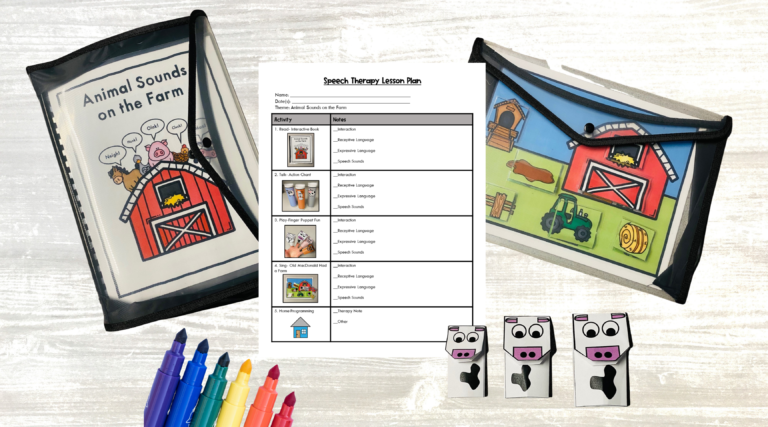Sharing is caring!
Do you feel a bit of anxiety when you need to write your preschool speech therapy lesson plans? Lesson plans are often seen as a necessary evil of the job. But I’m here to tell you that planning preschool speech therapy activities using a lesson plan format doesn’t need to be a painful process.
Keep reading to get answers to frequently asked questions about speech therapy lesson planning. A strategy for creating a lesson plan based on preschool speech therapy themes is also included!
Do I really need to have lesson plans?
Does this question sound familiar? Every speech therapist has asked this question at one time or another. The answer is YES! Lesson plans help you get organized and are best practice.
How do I find time to write lesson plans?
I’m not going to lie to you. Writing a lesson plan is time consuming. However, a well written plan can be used for your entire career. If you don’t have time to write lesson plans, there’s no shame in purchasing them.
Do you want to start building your speech therapy lesson plan library? Download my free farm theme lesson plan now!
Where do I start with my lesson planning?
Always start with great activities! Engaging activities are the key to making learning possible with your youngest students. Don’t be afraid to encourage curiosity or create surprise with your lessons. Make your students laugh. Learning does not happen when students are bored. If you create positive emotions through your activities, learning will follow.
Follow these steps to create your own preschool speech therapy lesson plans.
Step 1: Choose a theme.
I organize my preschool speech therapy lesson plans based on themes. Themes typically focus on subjects (i.e., farm), emotional qualities (i.e., happiness), or routines (i.e., bedtime).
Below is the lesson plan template I use. The theme is highlighted at the top.
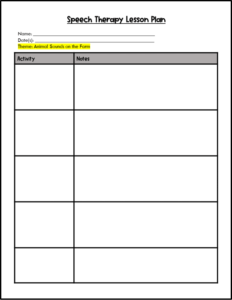
Step 2: Find your materials or make your own activities.
Gather up toys and books that fit your theme. You can also use things that you have created, such as adapted books or communication boards.
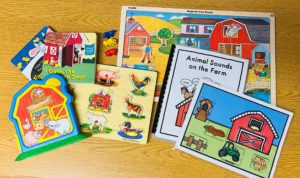
Step 3: Organize your materials using the following framework.
Look at the items you gathered and decide how to use them. You might not use everything.
I utilize the following framework to help me decide which materials to use. There are four categories of activities in my framework. Each category is based on activities that typically developing children are exposed to during the first few years of life.
1. Play
All humans play! Play develops along a continuum, starting at sensory-motor and ending at pretend play. There are strong links between play and language. It’s also fun and creates positive emotions that help students learn.
2. Talk
All humans talk, whether verbal or sign! Hearing others talk helps young children learn language. Whether it’s through conversation, chants and rhymes, storytelling, or verbal streams of consciousness, talking must be a integral part of any lesson plan.
3. Sing
All humans sing! Songs are great for learning language structure and new vocabulary. Also, the rhyming patterns of songs expose a young child to phonological awareness. Singing is a must have when creating lesson plans.
4. Read
Almost all human cultures read! Books are a great way to model the structure of language and expose a child to new vocabulary. Stories support narrative skills and teach schemas that are important for understanding how the world operates. Reading should be an essential element to any speech therapy lesson plan.
An example of how I organize this framework into my lesson plan template is below. The activities in the framework can go in any order, based on what makes sense for the lesson. I then add the specific materials (from step 2) that fit each category. Finally, I add pictures.
 ⇒
⇒ 
Can I use a lesson plan like this with multiple students?
Absolutely! This plan can be differentiated to meet the needs of all your preschool students. Following a developmental continuum, there are 4 ways to differentiate your activities.
4 Ways to Differentiate Your Speech Therapy Activities
1. Interaction Skills

Interaction skills must be addressed first, because they build the foundation for language development.
Interaction skills include:
- Enjoying interactions with familiar people.
- Maintaining eye contact with others.
- Showing joint attention (shared focus on an object).
- Initiating interactions or responding to adult interactions.
- Imitating gestures, sounds, and words.
- Taking turns with gestures, sounds, and words.
- Attending to an activity.
2. Receptive Language

Simply stated, receptive language is a child’s ability to understand others. Good receptive language is the key to strong expressive language skills.
Receptive language includes:
- Responding to the child’s own name.
- Pointing to objects/pictures upon request.
- Following familiar and novel directions.
- Understanding age-appropriate questions.
- Understanding a variety of words: nouns, verbs, concepts, etc.
3. Expressive Language

Expressive language skills are the ability for a child to use words, phrases, and sentences to communicate thoughts.
Expressive language includes:
- Using a variety of words.
- Using phrases and sentences to make comments and ask questions.
- Having a short conversation.
- Using correct grammar much of the time to organize sentences.
4. Speech Sounds
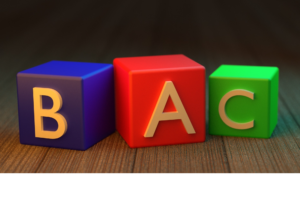
Speech sounds should only be directly addressed once a child has solid interaction skills, receptive language abilities, and expressive language.
How to incorporate sound development into therapy with younger students (not yet in 4K):
- Use fun envioronmental sounds in your play routines. (i.e., animal sounds, vehicle noises, etc.)
- Have students imitate sounds at the beginnings of words.
- Use rhymes to increase phonological awareness.
- Model words at a slower rate.
Below is the differentiation portion of my lesson plan template. This is the place where I record session data.
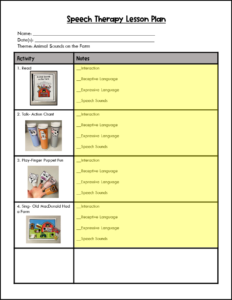
How do I use this lesson plan during a speech therapy session?
I make a copy of the lesson plan for each preschool student. The activity column, with the pictures, serves as a visual schedule for my students. I write my data in the notes column. Home programming and communication with the caregiver can be recorded in the last row of the lesson plan.
This is an example of a completed lesson plan with therapy data.
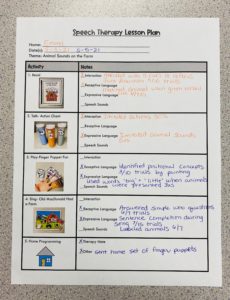
Do you have any lesson plan templates I can use?
Coming soon! My itinerant clinician starter kit, which includes a blank lesson plan template, will be available for download in the near future.
Click here to download the lesson plan used in this post for FREE!
Key Points
Here are the key takeaways when creating your preschool speech therapy lesson plans.
- Plan your therapy lessons around themes.
- Gather materials you already have that fit your theme.
- Use a framework to organize your materials into specific activities. Play, talk, read, and sing during every session.
- Differentiate your activities based on where the student is functioning. Most preschool students need support in one or more of these areas: interaction, receptive language, expressive language, and/or speech sound development.
- Have fun planning!
Grab Your Free Lesson Plan!
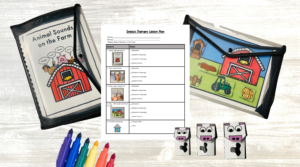
Click here to get your FREE lesson plan! The following items are included.
- A language lesson plan for preschool and 4K students. The theme of this lesson is Animal Sounds on the Farm.
- Printables for the four activities featured in the lesson plan. Assembly is required, but it is well worth the time to have a plan that will last your entire career.
- A home programming/caregiver communication form.
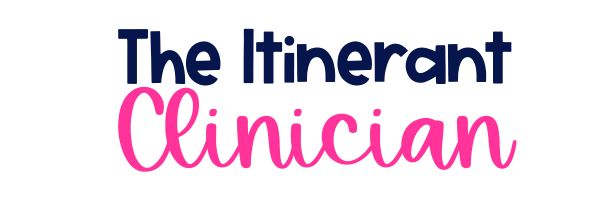
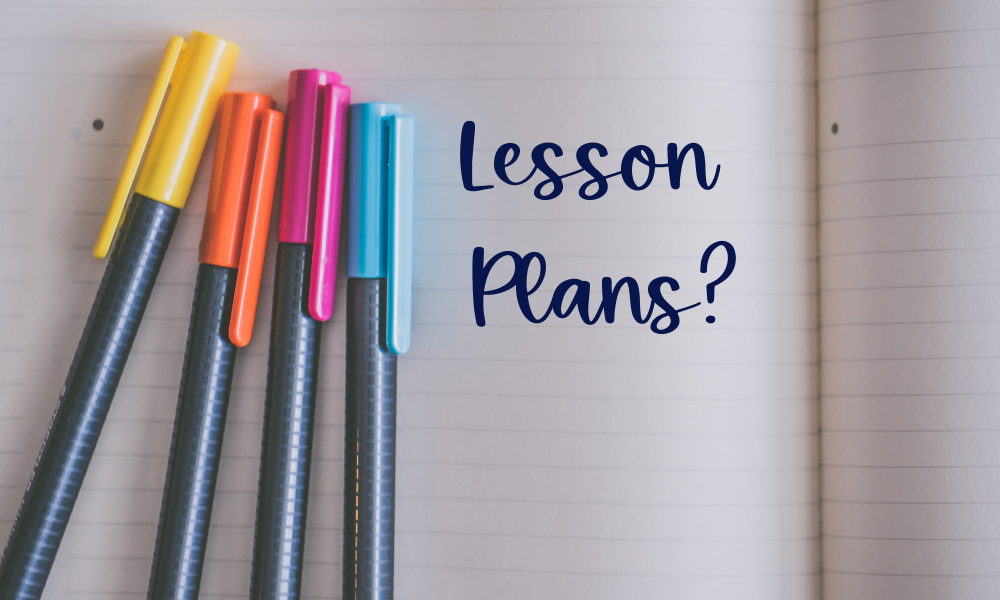
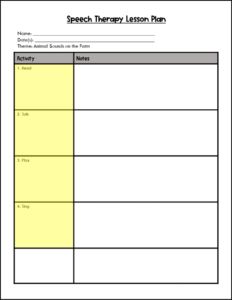 ⇒
⇒ 